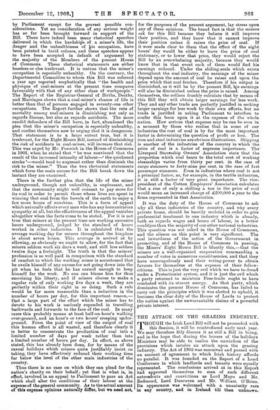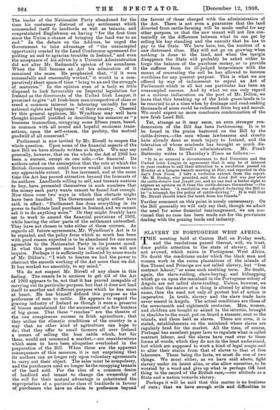THE ATTACK ON THE GRAZING INDUSTRY. T HOUGH the Irish Land
Bill will not be proceeded with this Session, it will be reintroduced early next year. We may therefore fitly discuss it as still a Bill in being, and in the hope that during the leisure of the holidays Ministers may be able to realise the unwisdom of the provisions which involve an attack upon the grazing industry. The Act of 1903 was conceived and passed with an amount of agreement to which Irish history affords no parallel. It was founded on the Report of a Land Conference in which landlords and tenants were equally represented. The conclusions arrived at in this Report hactlrroved themselves to men of such different ece ents and convictions as Lord Mayo and Mr. an Redmond, Lord Dunraven and Mr. William O'Brien. Its appearance was welcomed with a unanimity rare in any country, and in Ireland till then unknown. The leader of the Nationalist Party abandoned for the time his customary distrust of any settlement which commended itself to landlords as well as tenants, and congratulated Englishmen on having " for the first time since the Union a chance of bringing the land war to an end." In the debate on the Address, he urged the Government to take advantage of " the unexampled opportunity created by the Land Conference agreement for putting an end to agrarian troubles in Ireland," and even the acceptance of his advice by a Unionist Administration did not alter Mr. Redmond's opinion of its soundness. When the Bill became an Act his admiration of it remained the same. He prophesied that, "if it were successfully and reasonably worked," it would in a com- paratively short space of time " bring to an end the struggle of centuries." In the opinion even of a body so little disposed to look favourably on Imperial legislation for Ireland as the directorate of the United Irish League, it promised to give " all Irish-born men irrespective of class or creed a common interest in labouring unitedly for the national rights and happiness " of their country. Cheered by this general applause, Mr. Wyndham may well have thought himself justified in describing his measure as " a business transaction, occupying some fifteen years, based, in common with all sound and hopeful economic trans- actions, upon the self-esteem, the probity, the mutual goodwill of all concerned."
Parliament is now invited by Mr. Birrell to reopen the whole question. Upon some of the financial aspects of the new Bill we have already written at length. We may say generally, however, that on the whole the Aot of 1903 has been a success, except on one side,—the financial. Its authors acted on the assumption that the rate at which the British Government could borrow would not increase to any appreciable extent. It has increased, and at the same time the Act has proved attractive beyond the forecasts of its authors. Landlords willing to sell, and tenants anxious to buy, have presented themselves in such numbers that the money each party wants cannot be found fast enough. Now there were two ways in which this obstacle might have been handled. The Government might either have said, in effect : "Parliament has done everything in its power to facilitate land purchase in Ireland, and we cannot ask it to do anything more." Or they might frankly have set to work to amend the financial provisions of 1903, while leaving the other parts of the settlement untouched. They have not chosen to take either of these courses. As regards all future agreements, Mr. Wyndham's Act is to be repealed, and the policy from which so much has been with good reason expected is to be abandoned for one more agreeable to the Nationalist Party in its present mood. In what this present mood has its origin we will not inquire. Perhaps it is sufficiently indicated by some words of Mr. Dillon's : "I wish to heaven we had the power to obstruct the smooth working of the Act more than we did. It has worked too smoothly, to my mind."
We do not suspect Mr. Birrell of any share in this feeling. The reason he is anxious to get rid of the Act of 1903 appears to be, not that it has proved incapable of carrying out its particular purpose, but that it does not lend itself to another and different purpose which he has more at heart. He has himself defined this purpose as the preference of men to cattle. He appears to regard the grazing industry of Ireland as though it were a preserve of bisous maintained for the amusement of a few hunters of big game. That these " ranches " are the theatre of the one conspicuous success in Irish agriculture ; that they utilise the climatic conditions of the country in a way that no other kind of agriculture can hope to do; that they offer to small farmers all over Ireland a means of selling the lean cattle which, but for them, would not command a market,—are considerations which seem to have been altogether overlooked in the preparation of the Bill. When these are the apparent consequences of this measure, it is not surprising that its authors can no longer rely upon voluntary agreements to carry out their object. The sales must be compulsory, and the purchasers need no longer be the occupying tenants of the land sold. For the idea of a common desire of landlord and tenant to change the ownership of the soil for their mutual advantage is substituted the expropriation of a particular class of landlords in favour of purchasers who have no claim to preference, beyond the favour of, those charged with the administration of the Act. There is not even a guarantee that the land diverted from cattle-farming will be made useful for any other purpose, or that the new tenant will not liye con- tentedly on the difference between what he can get by selling his hay standing and the annuity that he has to pay to the State. We have here, too, the nucleus of a new distressed class. Hay will not go on growing when nothing is done to the land, and when the margin disappears the State will probably be asked either to forgo the balance of the purchase money, or to provide the sufferer from its ill-judged benevolence with the means of renovating the soil he has allowed to become worthless for any present purpose. This is what we are offered by way of inducement to repeal an Act of Parliament which in all but one particular has been an unexampled success. And by what we can only regard as a curious indiscretion on the part of Mr. Dillon, we learn that this breaking up of the Irish grass-lands is to be resorted to at a time when by drainage and road-making thousands of acres could be redeemed from bog and marsh. We could expect no more conclusive condemnation of the new Irish Land Bill.
Yet, strange as it may seem, an even stronger con- demnation of the Bill has been forthcoming. It is to be found in the praise bestowed on the Bill by the cattle-drivers,—the men whose lawlessness and cruelty have already done so much injury to Ireland, and the toleration of whose misdeeds has brought so much dis- credit on Mr. Birrell's administration. Mr. Frank Battersby writes to Thursday's Times as follows :- "It is so unusual a circumstance to find Unionists and the United Irish League in agreement that it may be of interest to your readers to call their attention to a resolution passed on Monday at a League branch meeting at Birr, and reported in this day's Irish Times. I take a verbatim extract from the report. `Mr. M. Dooley, who presided, said the Land Bin was just what the cattle-drivers had fought for, and no one bad a better right to express an opinion on it than the cattle-drivers themselves '—the italics are mine. 'A resolution was adopted declaring the 'Bill to be "a triumph for the policy of cattle-driving." ' It is well that Mr. Birrell should learn the truth from his friends."
Further comment on this point is surely unnecessary. On the Bill generally we will only say that, though we admit the need for some financial rearrangement, we are con- vinced that no case has been made out for the provisions dealing with the grazing lands and industry.































































 Previous page
Previous page